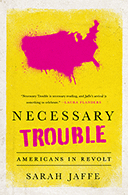Building rural power with Down Home North Carolina
Brigid Flaherty moved home to rural North Carolina after the election of Donald Trump to put her years of organizing experience to work “down home,” bringing together a multiracial organization of working-class people to build power in their communities. A year later, Down Home North Carolina has organizers and members in several counties and campaigns on national, regional and local issues, from healthcare to racial justice to energy bills. Flaherty joins me with member Kischa Peña and organizer Juan Miranda to talk about Down Home’s work in the last year and what’s coming up for them in 2018.
BF: When we were looking at the political makeup of North Carolina and what had happened since 2010 and the far-right takeover of the state and then moving into 2016 and watching that happen at the federal level, it felt like the best offense that we were going to have was to make sure that we were building strong local leadership in places in North Carolina that weren’t necessarily the places that had a lot of infrastructure. For us, this felt like a long-term project that needed to happen in order to make sure that working people got what they deserved, were able to build their leadership, and flex their muscle so that we could really be making winds that could change people’s lives in the years to come.
We said in November that we were going to start Down Home and then actually got off the ground in June this year. We have been around for about six months. Originally, it started out just Todd and I doing the organizing. I moved back to the mountains where my mother lives and I was actually living with her for the first few months and Todd was organizing in Alamance in the center part of the state. We just got out on the doors using a listening survey. We went with three broad questions, basically, which were: What are the issues that matter most to you and your family? Who or what is responsible for those issues? What are your solutions?
I think one of the things we really felt we learned from the 2016 election is that a lot of working people don’t feel listened to. The parties have never contacted them. It felt like a lot of people were speaking for them and yet they were like, “Y’all have never come to our door. You have never sat in our living room.” Again, we have only been around for six months. We basically used the first four and a half/five months to just listen and use that survey to really be able to develop the leaders and develop the issues that would be the things that we were going to fight on as Down Home. That is really how we got started.
Up at The Progressive
Up at Truthout
Up at In These Times.
Interviews for Resistance is a syndicated series of interviews with organizers, agitators and troublemakers, available twice weekly as text and podcast. You can now subscribe on iTunes! Previous interviews here.



